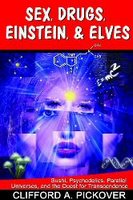Monday, January 23, 2006
Make you believe that I am God?
On a cool Autumn night, you are gazing up at the sky when a being suddenly appears and asks, "What can I do to make you believe that I am God?" What is your answer?
Here are some responses I received. More responses are in my book The Paradox of God.
- You could ask Him to explain why He believed he was God.
- You could ask Him to find a rock He can’t lift, and lift it.
- First, ask the being to define what God is. Second, ask for five arguments -- understandable to the best human minds -- that provide testable evidence as to the existence of God. Finally, make sure that Steven J. Gould, Martin Gardner, and Richard Dawkins would accept this evidence.
- Is it possible that there is no single act that could be used to convince you that the being was God? Because anything God says or does could result from a sufficiently advanced technology, we could not know if God is merely some alien playing jokes on humans. However, if the entity is God, He should be able to adjust the nature of our brains so that we truly believe that the entity is God.
Comments:
<< Home
Luke 16:19-31 "Now there was a certain rich man, and he was clothed in purple and fine linen, living in luxury every day. A certain beggar, named Lazarus, was laid at his gate, full of sores, and desiring to be fed with the crumbs that fell from the rich man’s table. Yes, even the dogs came and licked his sores. It happened that the beggar died, and that he was carried away by the angels to Abraham’s bosom. The rich man also died, and was buried. In Hades, he lifted up his eyes, being in torment, and saw Abraham far off, and Lazarus at his bosom.
He cried and said, ‘Father Abraham, have mercy on me, and send Lazarus, that he may dip the tip of his finger in water, and cool my tongue! For I am in anguish in this flame.’
"But Abraham said, ‘Son, remember that you, in your lifetime, received your good things, and Lazarus, in like manner, bad things. But now here he is comforted and you are in anguish. Besides all this, between us and you there is a great gulf fixed, that those who want to pass from here to you are not able, and that none may cross over from there to us.’
He said, ‘I ask you therefore, father, that you would send him to my father’s house; for I have five brothers, that he may testify to them, so they won’t also come into this place of torment.’
"But Abraham said to him,
‘They have Moses and the prophets. Let them listen to them.’
"He said, ‘No, father Abraham, but if one goes to them from the dead, they will repent.’
"He said to him, ‘If they don’t listen to Moses and the prophets,
neither will they be persuaded if one rises from the dead.’"
He cried and said, ‘Father Abraham, have mercy on me, and send Lazarus, that he may dip the tip of his finger in water, and cool my tongue! For I am in anguish in this flame.’
"But Abraham said, ‘Son, remember that you, in your lifetime, received your good things, and Lazarus, in like manner, bad things. But now here he is comforted and you are in anguish. Besides all this, between us and you there is a great gulf fixed, that those who want to pass from here to you are not able, and that none may cross over from there to us.’
He said, ‘I ask you therefore, father, that you would send him to my father’s house; for I have five brothers, that he may testify to them, so they won’t also come into this place of torment.’
"But Abraham said to him,
‘They have Moses and the prophets. Let them listen to them.’
"He said, ‘No, father Abraham, but if one goes to them from the dead, they will repent.’
"He said to him, ‘If they don’t listen to Moses and the prophets,
neither will they be persuaded if one rises from the dead.’"
Simple, have the being make me God. If it can't make me God, he can't be much of a God. If the being makes me God, then I have my answer.
There should be a corollary to Clarke's Third Law which says that any sufficiently advanced intellect will be indistinguishable from God.
I would ask God to cook a dish so disgusting even he couldn't eat it. And then I'd eat it.
Man, that would be a great story to tell people over a couple of beers.
I would ask God to cook a dish so disgusting even he couldn't eat it. And then I'd eat it.
Man, that would be a great story to tell people over a couple of beers.
Hey, I didn't realize that your the author of the book I've just finished (Paradox of God)! I loved it.
I'll be checking this site more in detail from now on.
Have a nice day.
I'll be checking this site more in detail from now on.
Have a nice day.
An answer to this conundrum is fraught. First, being an animal, limited by the inductive capacities of our senses and intellect, there are many things (indeed, most things) that we have no "absolute" proof of. We can confidently assert the platonic existence of certain things, such as integers or mathematical truths. We might venture to say with confidence things like "I exist", although you can even find people to argue with you on that point. So what hope do we have when a being appears making some claim that is, by the definition of our limitations, impossible to prove?
Any material proof offered might be a lie, or beyond our power to independantly verify.
Any "act" that changes our nature (for example, changing our brains so we "know" the being's claims are true) could also be effected by naturalistic means like drugs, brainwashing or the deft rearrangements of our neurons. In principle, we can have no confidence that a powerful, but non-divine being is not manipulating us at that level to make us think his proofs are sound.
If confronted by such a being, my conversation would go like this:
Being: What can I do to prove I am God?
Me: I can know little with absolute certainty. Nothing I ask for by way of proof is incapable of fabrication by a non-divine being. Unless I am greater than you, unless I become your God in the way you suggest you are to me, proof is impossible, and even then, I may be deceived. Your proofs are useful, but I am warning you that there will always be a shortfall that will need to be filled by Faith, just like Gödel's incompleteness theorem in mathematics states there are statements that are true although they cannot be formally proved.
As a limited, matter-based being, all I can say is: if you can do all the things my definition of God requires, such as intervening in my world to guide me, answer prayers, provide correction, protection and justice; if you can cause my conscious essence to persist after my bodily demise and cause me to exist with some purpose eternally in an afterlife, (including beyond the heat death of this material universe, because I mean "eternal" in the strong sense); if you can relate to me as a personal diety, forgive me of sins (if sins require forgiveness), and if there is no entity capable of countermanding you, then ultimately, if I cannot know if you *are* the one, true God, then I don't care either, because you are indistinguishable from God in every sense that matters to me as a person.
Any material proof offered might be a lie, or beyond our power to independantly verify.
Any "act" that changes our nature (for example, changing our brains so we "know" the being's claims are true) could also be effected by naturalistic means like drugs, brainwashing or the deft rearrangements of our neurons. In principle, we can have no confidence that a powerful, but non-divine being is not manipulating us at that level to make us think his proofs are sound.
If confronted by such a being, my conversation would go like this:
Being: What can I do to prove I am God?
Me: I can know little with absolute certainty. Nothing I ask for by way of proof is incapable of fabrication by a non-divine being. Unless I am greater than you, unless I become your God in the way you suggest you are to me, proof is impossible, and even then, I may be deceived. Your proofs are useful, but I am warning you that there will always be a shortfall that will need to be filled by Faith, just like Gödel's incompleteness theorem in mathematics states there are statements that are true although they cannot be formally proved.
As a limited, matter-based being, all I can say is: if you can do all the things my definition of God requires, such as intervening in my world to guide me, answer prayers, provide correction, protection and justice; if you can cause my conscious essence to persist after my bodily demise and cause me to exist with some purpose eternally in an afterlife, (including beyond the heat death of this material universe, because I mean "eternal" in the strong sense); if you can relate to me as a personal diety, forgive me of sins (if sins require forgiveness), and if there is no entity capable of countermanding you, then ultimately, if I cannot know if you *are* the one, true God, then I don't care either, because you are indistinguishable from God in every sense that matters to me as a person.
Write down everything you're thinking in mathematical form and the same in seven languages -- on seven seperate pieces of paper.
Place your responses in seven sealed, stamped envelopes and send them to seven magazines of your choice.
If it get's published seven times, you've got my vote.
Place your responses in seven sealed, stamped envelopes and send them to seven magazines of your choice.
If it get's published seven times, you've got my vote.
I once asked that question to atheist philosopher Keith Parsons. He told me that if the stars in the Virgo cluster were to spell out the words "Turn Or Burn This Means You Parsons," tha the would turn.
If God is the engine of existance then I would say: "Possible God...you need to not exist to prove that you exist".
If God created everything then his absence should uncreate everything. Not "destroy" and change a planet into an asteroid belt...or kill a person, but cease everything.
If God created everything then his absence should uncreate everything. Not "destroy" and change a planet into an asteroid belt...or kill a person, but cease everything.
A typical dictionary definition of hypnosis states that it is: a state that resembles sleep but that is induced by suggestion. However, anyone who has tried hypnosis (and any self respecting hypnotist) will tell you that this is a very simplistic view of the subject!
A much better description comes from the Free Online Dictionary which states that hypnosis is: an artificially induced state of consciousness, characterised by heightened suggestibility and receptivity to direction. So what does this mean and how can it be used to your advantage?
Well, the subject of hypnosis has been discussed and pondered since the late 1700s. Many explanations and theories have come and gone though science, however, has yet to supply a valid and well-established definition of how it actually happens. It's fairly unlikely that the scientific community will arrive at a definitive explanation for hypnosis in the near future either, as the untapped resources of our 'mostly' uncharted mind still remain something of a mystery.
However, the general characteristics of hypnosis are well documented. It is a trance state characterized by extreme suggestibility, deep relaxation and heightened imaginative functioning. It's not really like sleep at all, because the subject is alert the whole time. It is most often compared to daydreaming, or the feeling you get when you watch a movie or read a captivating book. You are fully conscious, but you tune out most of the outside world. Your focus is concentrated intensely on the mental processes you are experiencing - if movies didn't provide such disassociation with everyday life and put a person in a very receptive state then they would not be as popular (nor would TV advertising be as effective!). Have you ever stated that a film wasn't great because you just couldn't 'get into it'???
This works very simply; while daydream or watching a movie, an imaginary world becomes almost real to you because it fully engages your emotional responses. Such mental pursuits will on most occasions cause real emotional responses such as fear, sadness or happiness (have you ever cried at a sad movie, felt excited by a future event not yet taken place or shivered at the thought of your worst fear?).
It is widely accepted that these states are all forms of self-hypnosis. If you take this view you can easily see that you go into and out of mild hypnotic states on a daily basis - when driving home from work, washing the dishes, or even listening to a boring conversation. Although these situations produce a mental state that is very receptive to suggestion the most powerful time for self-change occurs in the trance state brought on by intentional relaxation and focusing exercises. This deep hypnosis is often compared to the relaxed mental state between wakefulness and sleep.
In this mental state, people feel uninhibited and relaxed and they release all worries and doubts that normally occupy their mind. A similar experience occurs while you are daydreaming or watching the TV. You become so involved in the onscreen antics
A much better description comes from the Free Online Dictionary which states that hypnosis is: an artificially induced state of consciousness, characterised by heightened suggestibility and receptivity to direction. So what does this mean and how can it be used to your advantage?
Well, the subject of hypnosis has been discussed and pondered since the late 1700s. Many explanations and theories have come and gone though science, however, has yet to supply a valid and well-established definition of how it actually happens. It's fairly unlikely that the scientific community will arrive at a definitive explanation for hypnosis in the near future either, as the untapped resources of our 'mostly' uncharted mind still remain something of a mystery.
However, the general characteristics of hypnosis are well documented. It is a trance state characterized by extreme suggestibility, deep relaxation and heightened imaginative functioning. It's not really like sleep at all, because the subject is alert the whole time. It is most often compared to daydreaming, or the feeling you get when you watch a movie or read a captivating book. You are fully conscious, but you tune out most of the outside world. Your focus is concentrated intensely on the mental processes you are experiencing - if movies didn't provide such disassociation with everyday life and put a person in a very receptive state then they would not be as popular (nor would TV advertising be as effective!). Have you ever stated that a film wasn't great because you just couldn't 'get into it'???
This works very simply; while daydream or watching a movie, an imaginary world becomes almost real to you because it fully engages your emotional responses. Such mental pursuits will on most occasions cause real emotional responses such as fear, sadness or happiness (have you ever cried at a sad movie, felt excited by a future event not yet taken place or shivered at the thought of your worst fear?).
It is widely accepted that these states are all forms of self-hypnosis. If you take this view you can easily see that you go into and out of mild hypnotic states on a daily basis - when driving home from work, washing the dishes, or even listening to a boring conversation. Although these situations produce a mental state that is very receptive to suggestion the most powerful time for self-change occurs in the trance state brought on by intentional relaxation and focusing exercises. This deep hypnosis is often compared to the relaxed mental state between wakefulness and sleep.
In this mental state, people feel uninhibited and relaxed and they release all worries and doubts that normally occupy their mind. A similar experience occurs while you are daydreaming or watching the TV. You become so involved in the onscreen antics
What's the point? There's no need to believe what is true because what is true I can know . There's no need to believe what is false because, well, it is false.
Post a Comment
<< Home
 Godlorica
Godlorica



























